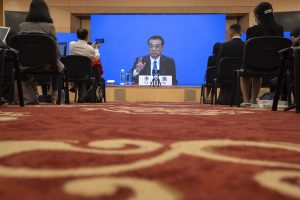China has held its National People’s Congress, and Premier Li Keqiang’s Government Work Report has attracted considerable interest in Japan. The Japanese perspective is largely as follows. First, the report seemed surprisingly modest, placing importance on the recovery of economic activity and social life after COVID-19. The emphasis was very much on measures for employment and similar issues. Second, and for that reason, the 6.6 percent increase in national defense expenditure stood out. Although the report clearly prioritized domestic recovery, China does not seem ready to abandon its rivalry with the United States. The third point noted in Japan was that there were many differences in wording from 2019.
Take for example the phrase, “high-quality joint building of the Belt and Road,” found in the section on the Belt and Road. This phrase was already being used in 2019, but the gross volume of infrastructure investments related to the Belt and Road declined in 2020, and the report suggests the possibility of more selective activities.
Second, on the topic of Taiwan, while China stated that it would, “adhere to the principle of “One China” under the “92 Consensus, promote the peaceful development of cross-Strait relations and advance the process toward the peaceful reunification of the motherland” in 2019, “the ’92 Consensus” was removed in 2020 and “Peaceful Development” has vanished. Perhaps this can be seen as Beijing taking a hardline stance on Taiwan. However, some corrections were made and these three sentences were added to the final document. The question arises as to why they were not included in the speech script but only added to the final document.
In foreign policy, although trade negotiations between China and the U.S. had been progressing, the following section from the 2019 Government Work Report vanished in 2020: “We will strengthen communication, dialogue, coordination, and cooperation with other major countries. We will deepen relations with our neighbors and expand mutually beneficial cooperation with other developing countries.” Expressions such as “New-type of major country relations” and “new international relationships” were important even in Xi Jinping’s party convention speeches in 2017, but the absence of references to major country relations and diplomatic relations with China’s counterparts in 2020 suggests a change in foreign policy direction.
Opinions are divided on what these changes might represent. One view is that domestic considerations are prompting China to adopt a tougher stance on foreign policy, and to become uncompromising on Hong Kong and Taiwan, as seen in the review of Hong Kong’s national security law.
There is a contrasting view, however, which argues that the report reflects a divergence of opinions in the Chinese establishment. For example, the fact that the report does not set an economic growth target may reflect an inability to agree on whether or not economic growth should be seriously considered, and if it is to be seriously considered, what the target number should be. Of course, even if a number was given, it is unclear whether it could be achieved, and perhaps there is the view that it was a rational decision, as setting a low number would in and of itself be damaging to the government.
Meanwhile, it has also been pointed out that phrases, “the ’92 Consensus,” and, “Peaceful Reunification,” were removed in relation to Taiwan because of difficulty in reaching an agreement on changes in wording for major country relations and diplomatic relations with surrounding countries – that is, they were removed precisely because an agreement wasn’t reached.
If one does adopt the position that cracks may have occurred within the Chinese government, then one must acknowledge that the government did reach a consensus to carry out a review of the Hong Kong version of the national security law. Conservatives will probably consent to the establishment of this law, and the forces that place comparative importance on Hong Kong’s economic functions may try to accelerate the situation by applying pressure on Hong Kong society through this review.
At any rate, there are certainly challenges in reading the Government Work Report from this year’s National People’s Congress. Japan’s analysis is that some kind of problem may have occurred in reaching an agreement within the government, in addition to the orthodox view that the Chinese government has not changed its stance towards the U.S. in terms of military affairs and security, while still considering the economy and society that have suffered due to COVID-19.
Shin Kawashima is a professor at the University of Tokyo.

































